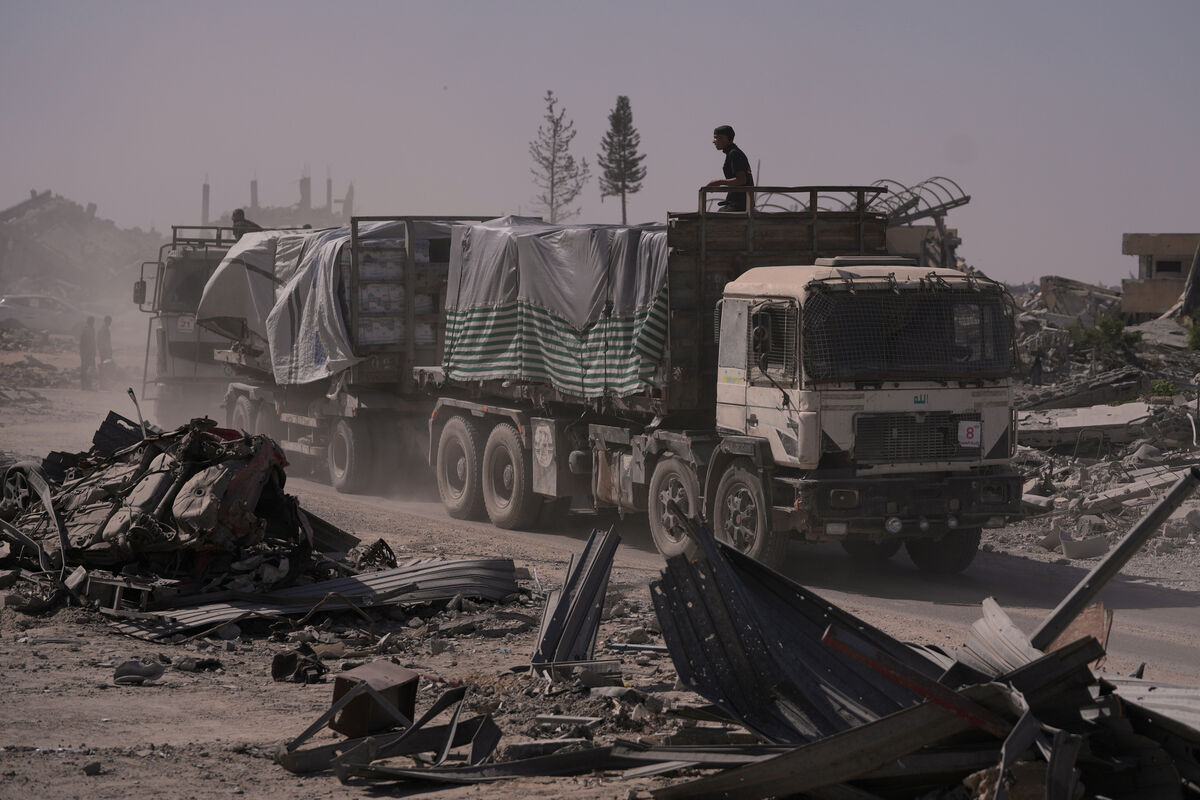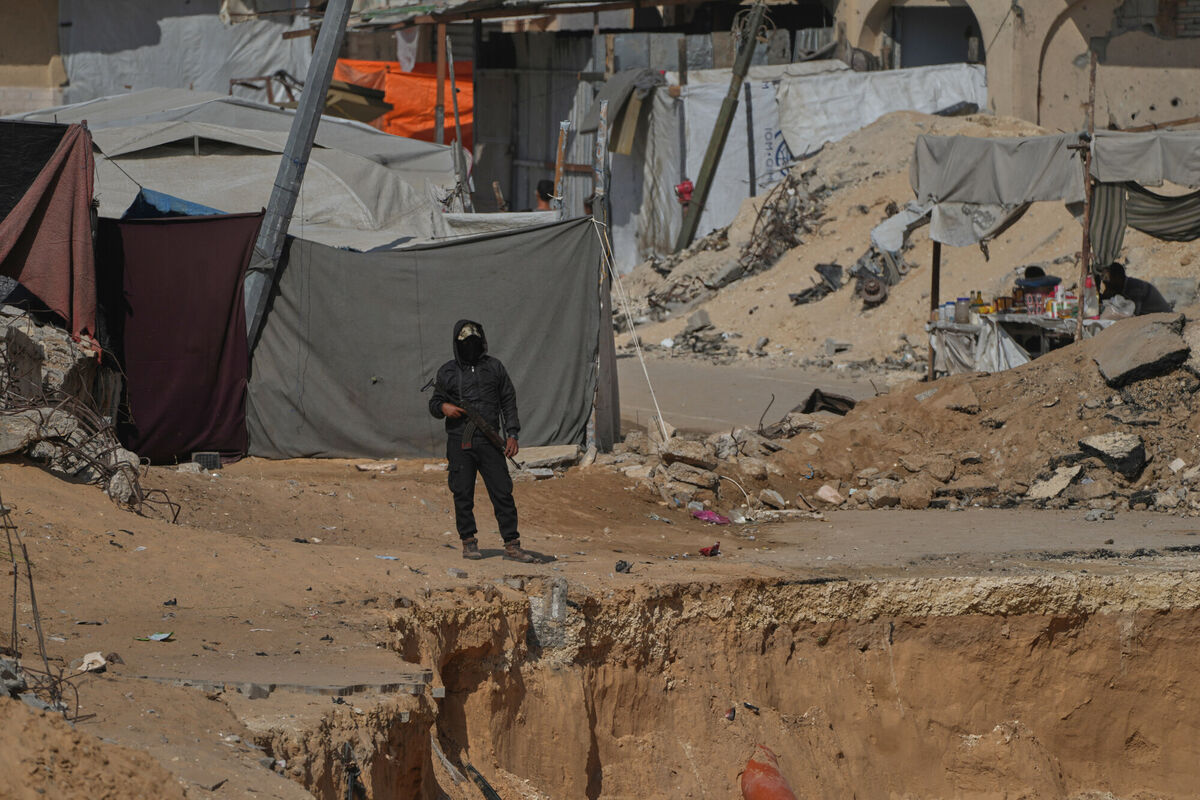There’s an old line about Ireland: that we’re a small country with a big flag — always at the march, never at the market. It’s the comforting myth we tell ourselves: a neutral nation, peacekeeping saints, standing proudly apart from the world’s imperial machinery.
But a new report released on Monday — ‘The Price of Prosperity – How US FDI Is Enabling Genocide in Gaza and Eroding Our Neutrality’ — tears the veil clean off. It says what most of us already suspected, and what the Government has gone to heroic lengths to deny: Ireland’s independence is rented, and the landlord lives in Washington.
We’re not a neutral state; we’re a semi-peripheral platform — a polite tax shelter for the very forces we claim to oppose.
The report’s authors — Pauline Doyle, Patrick Bresnihan, and Patrick Brodie — call it “FDI nationalism”, a faith as devout as any religion: that what’s good for US multinationals is good for Ireland. Forget saints and scholars; our new trinity is Amazon, Apple, and Alphabet. We pray at the altar of corporation tax and bow toward Silicon Valley at noon.
This ideology — half-economic miracle, half-Stockholm syndrome — has left us paralysed in the face of Gaza’s horror. We can issue statements of “grave concern” until the microphones melt, but when it comes to action — sanctions, trade bans, enforcement of international law — we suddenly find our shoelaces tied.
Because to punish Israel is to risk angering the United States, and to anger the United States is to risk a capital strike. The report puts it starkly: 75% of our corporation tax, 69% of our inward investment, and roughly the entire illusion of our prosperity depend on American companies.
We’ve built our economy like a child balancing on a stool — but the stool belongs to someone else. And now, as Gaza continues to bleed despite a so-called ceasefire, that stool is wobbling.
The report is less an accusation than a diagnosis. It argues that Ireland’s economic dependency has effectively handed the US a de facto veto over our foreign policy. When the Taoiseach calls Israel’s actions “genocidal”, it makes for fine television — but it’s performance art, not policy. If words were weapons, Gaza would be free by now, and Ireland would be its liberator.
Consider the Occupied Territories Bill, passed in the Dáil with a large majority back in 2019, designed to outlaw trade with illegal Israeli settlements. It had legal clearance, moral backing, and popular support.
It also had one fatal flaw: it offended the United States. Enter the ambassadors, the lobbyists, the “concerned investors”. Leaked documents show US and Israeli officials warning that the bill would breach anti-boycott laws and jeopardise investment.
Overnight, the moral clarity vanished. The Government shelved the bill, citing vague “EU legal complexities”, as if Michel Barnier were hiding under the Cabinet table.
Later, it emerged that the Attorney General’s legal advice was misrepresented. That the “risks” were exaggerated. That Washington had simply leaned on Dublin, and Dublin had folded like a pub umbrella.
It was the geopolitical equivalent of being caught holding your coat while someone else does the mugging.
We’ve been here before, of course. Shannon Airport has quietly serviced American wars for two decades.
We’ve supplied the “neutral” airspace; they’ve supplied the ordnance. But where Shannon was a physical symbol of compromise, our new complicity is digital.
Project Nimbus — the $1.2 billion cloud contract between Israel and tech giants Amazon and Google — runs, or ran, partly through Ireland. Microsoft’s Azure servers here helped store data for Israel’s Unit 8200, the cyber-intelligence division accused of enabling mass surveillance on Palestinians.
So when a drone finds its target in Khan Younis, there’s a chance the algorithm took a detour through Dublin.
It’s not that Irish engineers are programming missiles — far from it. It’s that the very infrastructure of genocide is now globalised, decentralised, sanitised. And Ireland, with its smiling IDA billboards and 12.5% tax rate, is a proud subcontractor in the business of moral laundering.
We’ve gone from exporting priests to hosting data centres. And both, in their own ways, promise salvation.
Paul Krugman once called it “leprechaun economics”, that great moment when Apple re-registered its intellectual property in Ireland and our GDP inflated by 26% overnight — a miracle without labour, the loaves and fishes of financialisation.
The report shows that Ireland’s trade in services now equals 154% of GDP. We’re not a real economy in the traditional sense; we’re a tax conduit wearing a tricolour.
And yet, we treat the FDI model as sacred scripture. Politicians who wouldn’t dream of questioning multinationals’ dominance will happily lecture us on neutrality and ethics. The contradiction is total: our foreign policy preaches conscience; our economic policy rewards compliance.
We have outsourced our morality.
 Trucks carrying humanitarian aid drive through Khan Younis, in the southern Gaza Strip on Monday. If Gaza is the moral mirror of our time, Ireland’s reflection isn’t flattering. Photo: AP/Jehad Alshrafi
Trucks carrying humanitarian aid drive through Khan Younis, in the southern Gaza Strip on Monday. If Gaza is the moral mirror of our time, Ireland’s reflection isn’t flattering. Photo: AP/Jehad Alshrafi
Perhaps the most startling revelation in The Price of Prosperity is that Ireland has become the world’s second-largest importer of Israeli goods — not because we’re eating Israeli oranges by the tonne, but because we’ve become a middleman in the transfer-pricing maze of the tech sector.
Intel, for instance, manufactures components in Israel, then routes them through Ireland for tax purposes. On paper, the trade looks enormous — €3.26 billion by 2024 — but in reality, it’s accounting smoke. Yet that smoke matters: it ties our fortunes to a state currently standing before the International Court of Justice on charges of genocide.
So when our leaders insist that “we support Palestinian rights”, the words dissolve under the weight of the balance sheet. If conscience were currency, we’d be broke.
For years, Ireland’s neutrality was our moral export — the little island that kept its hands clean. But neutrality, it turns out, doesn’t pay the bills.
The report lays bare a co-ordinated campaign by defence lobbyists, think tanks, and tech-military partnerships to “modernise” our security policy. The Irish Defence and Security Association, with members like Lockheed Martin, an American defence and aerospace contractor, has the ear of politicians.
Forums on neutrality are re-framed as “consultations,” where the conclusions are pre-written. We’re told we must “rethink neutrality” in light of global threats. What they mean is: neutrality no longer suits the investors.
And so, while the public remains overwhelmingly in favour of staying out of military alliances, the Government edges us closer to NATO through a thousand bureaucratic nudges — joint exercises here, “dual-use technologies” there, until one day we wake up with an arms industry of our own.
 Ireland’s solidarity with Palestine isn’t sentimental. It’s historical.
Ireland’s solidarity with Palestine isn’t sentimental. It’s historical.
The report calls it “manufacturing consent for militarisation”. You could also label it sleepwalking into someone else’s war.
What’s extraordinary is how polite this whole arrangement is. No tanks, no coups — just balance sheets and briefing notes. A quiet colonisation through spreadsheets.
The authors argue that our dependency is “structural complicity”: that we’ve traded sovereignty for the illusion of prosperity. We’ve become a country that rents its conscience by the quarter.
Yes, American FDI has given us jobs, revenue, stability. But it’s also given us silence. The kind of silence that greets illegal arms shipments through Irish airspace, or the Central Bank’s decision to keep selling Israeli bonds even after the International Court of Justice ruled that genocide was plausible.
This is the new moral arithmetic: better not to ask questions if the answers affect the tax take.
There are many haunting lines in the report, but one stands out: “The Irish government increasingly operates on a dual track — giving rhetorical support to popular causes like Palestinian rights while actively working against them behind closed doors.”
We see it every day: candlelight vigils in Dublin, Cork and Galway; hashtags and marches; and then, behind the scenes, ministers soothing ambassadors, ensuring no policy gets too ambitious. The democratic deficit yawns wider by the week.
Public opinion says “sanction Israel”. The Government says “we must act within our constraints.” But those constraints aren’t legal — they’re financial. Democracy, in theory, means one person, one vote. In practice, it means one multinational, one veto.
To read The Price of Prosperity is to realise that Ireland’s fabled miracle — the leap from poverty to plenty — came with blood-soaked small print. We invited the world’s richest corporations to use our soil as a staging post.
They accepted, graciously, on the condition that we mind our manners. And we did.
But now, as the bombs fall on Gaza and the footage loops endlessly, the moral bill is arriving. Because neutrality, once compromised, doesn’t stay half-compromised. It becomes complicity. And sovereignty, once leased, is rarely returned.
The question is what we do next. The report doesn’t offer easy answers, but it hints at something radical: that true independence requires re-imagining our economy, not just our diplomacy.
That means building sovereign industries, supporting co-operative ownership, aligning trade with justice, not just profit. But it also means courage — the kind of courage that would see Ireland enact the Occupied Territories Bill despite US displeasure. The kind of courage that would risk economic backlash in defence of international law.
Imagine the shockwaves if we did it — if a small island finally stood up to the largest empire in the world and said: our democracy is not for sale. We’d lose investment, perhaps. But we might regain something rarer: credibility.
It’s a peculiar thing, this Irish condition — to have suffered colonisation and then rehearse it on ourselves, voluntarily, through economics.
We used to export our people; now we export our sovereignty. We’ve traded the chains of empire for the golden handcuffs of FDI. And we call it success.
To the task ahead, then. Ireland’s solidarity with Palestine isn’t sentimental. It’s historical. We recognise occupation when we see it.
But solidarity that stops at sympathy is theatre. Real solidarity would mean confronting the structures that bind us — the deals, the dependencies, the polite silences that keep the money flowing.
If Gaza is the moral mirror of our time, Ireland’s reflection isn’t flattering.
The challenge now is not to weep for Palestine while building the digital infrastructure that surveils it. Not to sing rebel songs while hosting the servers of empire. Not to mistake our rented wealth for real power.
As The Price of Prosperity makes painfully clear, we can’t serve both justice and dependence. And maybe that’s the beginning of wisdom — to realise that prosperity, without principle, is just another form of poverty.
Colin Sheridan is an Irish Examiner journalist and a former UN Peacekeeper

